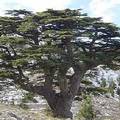 世上僅存的黎巴嫩雪松由聯合國教科文組織生物圈保留區(Biosphere Reserve)保護著,它也是黎巴嫩南部唯一的保育區,但在以色列持續轟炸黎巴嫩的行動之下,此保育區正面臨極大的危機。位於黎巴嫩境內25%的雪松林都被納入此保護區內,而雪松林也曾一度覆蓋了此處大部份的山區。
世上僅存的黎巴嫩雪松由聯合國教科文組織生物圈保留區(Biosphere Reserve)保護著,它也是黎巴嫩南部唯一的保育區,但在以色列持續轟炸黎巴嫩的行動之下,此保育區正面臨極大的危機。位於黎巴嫩境內25%的雪松林都被納入此保護區內,而雪松林也曾一度覆蓋了此處大部份的山區。
在此地,數座雪松車站是重要而突出的秀麗景色,高大的雪松是此幅景象的主要貢獻者。而有著大小不同的雪松森林區塊點綴的黎巴嫩山,在西側邊坡則為村落所環繞。
此地區包含黎巴嫩山存留下來的少數自然景色,這些景色在紀爾格美斯史詩、舊約聖經和無數的書寫歷史紀錄中都有描述和記載。
國際自然保育聯盟的齊拉尼於7月28日轉述,Al Shouf雪松生物圈保育區的科學協調專員哈尼說保護區已經遭到轟炸。
在2005年聯合國教科文組織選定生態圈保育區,且據其表示Shouf生態圈保留區對保護野生動物有特別的含義,意味著長期保育世界上如狼、野貓和條紋鬣狗等較大型的哺乳動物的最佳前景,哈尼表示:在上方的坡地上建造了一處池塘,以提供動物飲水來源,並以此鼓勵牠們留在保留區裡。但是現在這些野生動物受到炸山和軍機嗡嗡作響的噪音以及空氣污染壓迫。
交界的28座村落環繞著保留區,主要的經濟活動包含農業和牧羊,近來還多了觀光業。Al-Shouf雪松保留區和同樣也在Shouf生態圈保留區裡的Ammiq溼地,都變成數千名遊客到黎巴嫩和該區觀光的主要自然勝地。
哈尼表示:「我們期待今年的遊客數字能突破過去數年來的紀錄。每件事暗示著都這個趨勢,包括6月時抵達的人數和7、8月的預訂人數。我們將收穫多年前種下而今收成的果實。」
但是這些希望如今都成了追憶。
前南非環境部長穆沙對這些衝突並不陌生。他表示該區域能永續發展的未來需要「強健的經濟、社會的公平與正義以及自然資源的完善管理。」
穆沙表示:「以上目標沒有任何一項能在武裝衝突時期獲得任何進展。和平、安全和穩定的實現必須是首要考量─這些是永續發展的先決條件。」
A UNESCO Biosphere Reserve that has sheltered some of the few remaining specimens of the famous cedars of Lebanon and the only ones in the southern part of the country is at risk from the ongoing Israeli bombardment of Lebanon. The reserve contains 25 percent of the Cedrus libani forests that remain in Lebanon, where once cedar forests covered large areas of the mountains.
At the local level several of the cedar stands are recognized as outstanding scenic landscapes, the larger cedars contributing in a most distinctive way to the landscape. The western slope of the mountain, with the different patches of cedar forests gives way to the surrounding villages.
The area encompasses one of the few remaining natural landscapes of Mount Lebanon that were described in the Epic of Gilgamesh and the Old Testament as well as in countless documents throughout written history.
Hala Kilani of the IUCN-World Conservation Union wrote Friday of Nizar Hani, scientific coordinator of Al Shouf Cedar Biosphere Reserve, who says the reserve has been bombed.
The Shouf Biosphere Reserve has special significance for the protection of wildlife, representing the best prospect for the long-term conservation of the larger mammal species such as wolf, wild cat and striped hyena, according to UNESCO, the United Nations agency which designated the biosphere reserve in 2005.
A pond has been established on the upper slopes, to provide a source of drinking water for animals and to encourage them to stay within the reserve. But now the wildlife is stressed from the noise and air pollution of the exploding munitions and the drone of military aircraft, Hani says.
There are 28 villages in the transition area surrounding the reserve, where the main economic activities include agriculture and pastoralism, with the recent addition of tourism. The Al-Shouf Cedar Reserve and the Ammiq Wetland, which is also in the Shouf Biosphere Reserve, were becoming a major natural attraction for thousands of visitors to Lebanon and the region.
"We were expecting the number of visitors this summer to break the record of all previous years," Hani said. "Everything was indicating to this, including the number of people who arrived in June and the reservations of July and August. We were going to reap the fruits of what we sowed over so many years."
But those hopes have now become a memory.
Formerly South African Environment Minister, Moosa is no stranger to conflict. He says a sustainable future in the region requires "a robust economy, social equity and justice, and sound management of the natural resources."
"None of these goals can be advanced in time of armed conflict," Moosa said. "Bringing about peace, security and stability must be the priority - they are preconditions for sustainable development.




